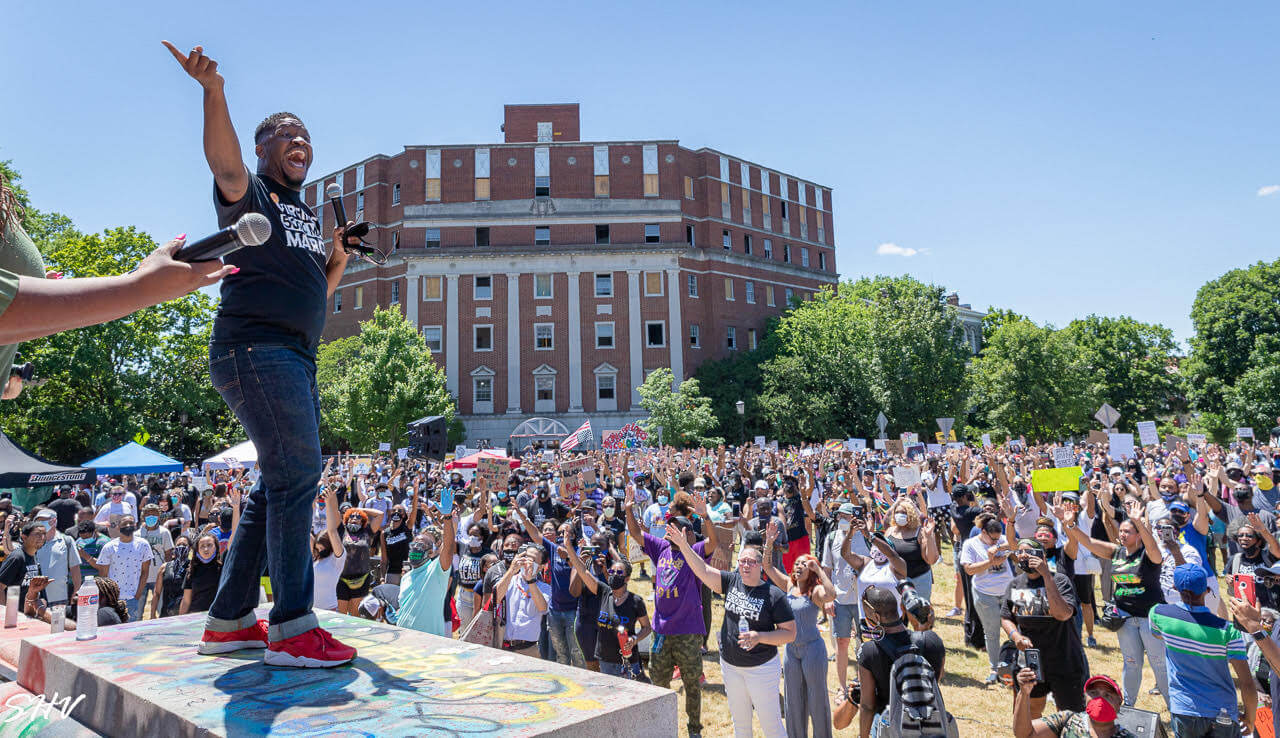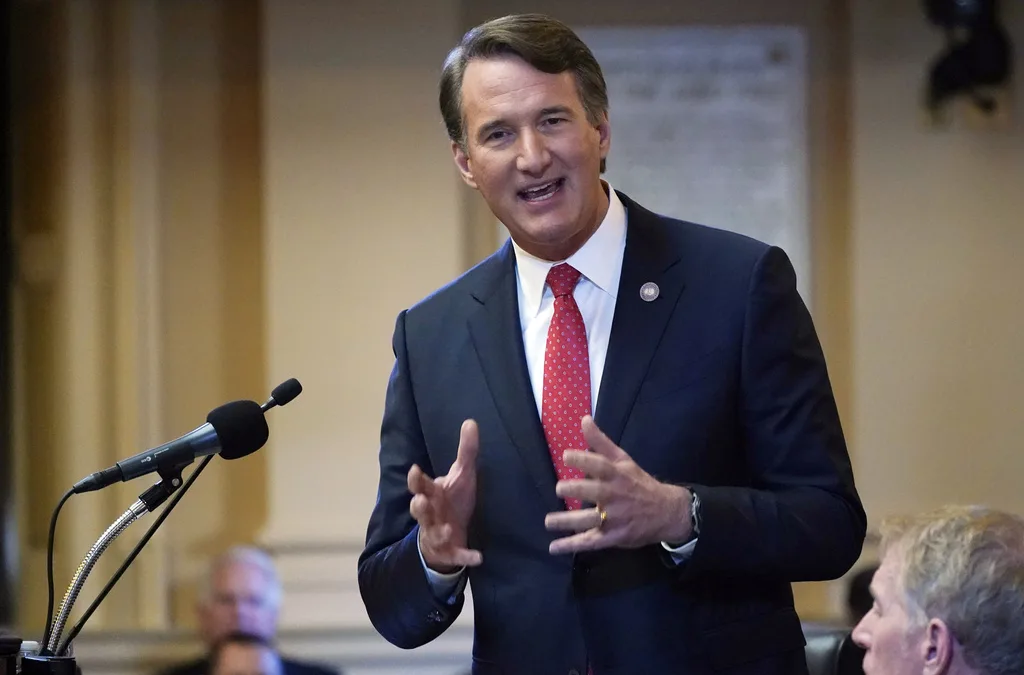
5,000 Man Protest in Richmond
Protests and rallies across the country erupted, seemingly overnight, when the video of police killing George Floyd went viral. But the demonstrations against racial injustice are not conjured out of thin air. It took people in communities throughout Virginia, some for the very first time, to organize their fellow citizens. Below we profile three people who have led protests in Virginia, and tell the story of how and why they organized action in their communities.
TRISTON HARRIS
Triston Harris is the main organizer of the 5,000 Man March, held on June 13 in Richmond. He said he made up his mind about organizing the march after seeing the video of Floyd’s death.
“You take a minute just to watch the George Floyd video and no matter how you feel about anything in the world, the humanity in that video… touches you. You know it’s a heart wrenching video,” Harris said in an interview. “That’s all it took to make me realize I had to do something and I think a lot of people feel the same way.”
He also said his one-year-old son was a major force behind his activism.
“Being a Black man with a Black son, I will say I feel so empowered for this cause [because] it’s a scary world we live in,” Harris said.
Harris said he knew his community was looking to participate in a show of solidarity that was empowering to attendees of all ages, especially if families with young children wanted to participate.

He used Facebook to spread the word about the march this Saturday, which had between 3,000 and 4,000 people participate. Organizers got permits for the route and coordinated with police to help close off streets. Harris said they did not talk with police about avoiding any use of force during the march, but they had volunteers in place and coordinated with other organizations to keep an eye out for any incidents.
“I think especially in Richmond, people were looking for a peaceful way to get their voices heard,” he said. “We wanted to give people a venue so that they can come out and bring their kids, and march against racism and discrimination and all the hate in the world.”
The march featured local speakers like Virginia Del. Delores McQuinn, Richmond Mayor Levar Stoney and George Floyd’s cousin, Tavares Floyd, who lives in Alexandria and works as a civil rights attorney.

“We hope that [during the march] our voices will be heard and that the ongoing mass protests will start to simmer on down,” Harris said, and turn into government action.
AMIRA MOSS
Amira Moss is an organizer of Norfolk’s June 7 march that was geared specifically towards children.
The goal for the Children of Norfolk March for Solidarity was to give children and their families an opportunity to make their voices heard. During their protest, the children shouted “Black Lives Matter!” and the names of Black people recently killed in America, including George Floyd, Breonna Taylor and Ahmaud Arbery. Moss viewed the march a success: “I think the kids made their point!”
There were also local speakers, like Moss herself, along with other march organizers. She explained that protesting and having conversations with children are opportunities to set an example.
“It was important to me because I believe when the children want their voices heard, it is up to the adults to make that happen,” Moss said. “It felt so liberating to walk in the march. It was my first time ever doing anything like that and I must say it felt like I was actually making a difference and so did the children.”
Moss said turnout was higher than the small group organizers expected. The organizers used social media platforms like Facebook and old fashioned word-of-mouth to let the community know about the march.
“There were over 136 children and parents and local community members who joined the march,” she said. “The turnout was amazing, more than I even expected. Everyone came with the same agenda and that was to say ‘Black Lives Matter!’”
ASHLEY LANE
Ashley Lane, the business manager of Crossroads Church in Fredericksburg, spoke on behalf of artist named Legin who was one of the main organizers of the march. Lane explained that Legin along with members of the Crossroads Church staff organized a march in the area with the Hampton Roads City Collective to give people in the religious community an opportunity to fight for social justice.
The Hampton Roads City Collective is a group of more than a dozen churches in the area that came together after the shooting death of Alton Sterling in 2016. Sterling was shot and killed by a police officer during a confrontation with police in Baton Rouge, Louisiana. His death also led to protests and calls for police reform.
“Churches are often seen as having their head in the sand, especially in America and especially on issues of social justice,” she said in an interview.
Lane estimated that a total of 3,500 to 5,000 people came out to the march on June 7, where there was chanting, moments of prayer and instances of people taking a knee and asking for repentance. Organizers got the word out about the march through social media posts on Facebook and Instagram, and participating pastors made announcements during services. The march took about six days of planning to get set up.
Lane said there was a fairly even split between Black and white people at the march, and church leaders held a debrief for pastors in the days after the march to discuss ways to move forward.
The demonstrations have also opened the door to discussions about police reform, Moss said.
“If I could change one aspect of policing it would be to hold each officer accountable to the people,” Moss said. “Although I feel that there is more than just one change that needs to be done, if we treated the hiring of police officers as we do the hiring of political officials there would be less police officers hiding their prejudice behind a badge.”
Politics

Opinion: The problem with Youngkin’s Charter-Lab schools push in 2024
The Problem Governor Glenn Youngkin introduced 233 amendments to the bipartisan budget so it was hard to know how to assess his budget–for example,...

What to know about Trump’s legal issues
Over the past year, former president Donald Trump has become the center of not one, not two, not three, but four criminal investigations, at both...
Local News

Virginia verses: Celebrating 5 poetic icons for National Poetry Month
There’s no shortage of great writers when it comes to our commonwealth. From the haunting verses of Edgar Allan Poe, who found solace in Richmond's...

Join the fun: Recapping Family Literacy Night’s storybook adventures
When’s the last time you read a book aloud with a loved one? If it’s difficult to answer that question, then maybe it’s time to dust off that TBR...




